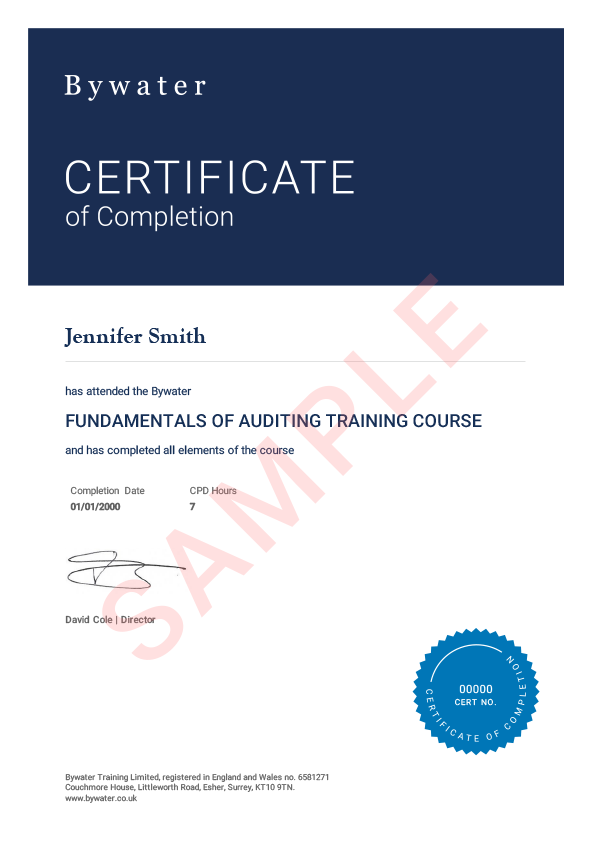Fundamentals of Auditing Training Course
DURATION
1 dayCPD
Equivalent to 7 hoursCERTIFICATES
All delegates will receive a certificate on completion.DELIVERY OPTIONS
Whether you are new to auditing or seeking a refresher, learn the essential skills needed to conduct effective audits on this concise Fundamentals of Auditing course.
This 1-day Fundamentals of Auditing training course explains what auditing is, the responsibilities of an auditor, and how internal audits are performed.
The course includes interactive workshops which give delegates the opportunity to practise their new skills while working in groups and under the guidance of the tutor. Exercises and discussions will cover topics such as questioning styles and writing a nonconformity report.
Click to open the Fundamentals of Auditing course flyer.
- staff whose organisations are due to be audited and who need to understand of the process
- current auditors seeking to refresh their auditing knowledge
- managers and owners of processes
- anyone planning to audit a management system or process
This Fundamentals of Auditing training does not focus on auditing against a specific standard. If you are looking for a course that provides these skills, then we recommend looking instead at our two-day Internal Auditor training courses or our five-day CQI and IRCA certified Lead Auditor training courses.
- introduction to auditing
- audit objectives
- process-based management systems
- audit checklists
- management system documentation
- managing the internal audit programme
- the internal audit process (preparation, performance, reporting, follow-up)
- question styles and sampling
- nonconformity writing
- attributes and characteristics of an auditor
- INTRODUCTION
- Workshop 1 What is an audit and the role of an internal auditor?
- Module 1 Introduction to auditing
- Workshop 2 Barriers and the culture of successful audits
- Module 2 Process-based management systems
- Module 3 Managing the internal audit programme
- Workshop 4 Factors determining audit frequency
- LUNCH
- Module 4 The internal audit process
- Module 5 Question styles and sampling
- Module 6 Nonconformity writing
- Workshop 5 Write a nonconformity report
- Module 7 The auditor
- CLOSE AND FEEDBACK
- describe the responsibilities of the internal auditor and the role of internal audits in maintaining and improving systems and delivering business benefits
- understand the skills necessary to plan and prepare for an internal audit
- create audit checklists
- gather objective evidence through interview and sampling of records
- apply differing questioning styles and sampling techniques to the audit of processes
- write factual nonconformity reports that help to improve the effectiveness of the management system
Delegates who attend the course for the full day will receive a certificate of completion.

Upcoming course dates










The Fundamentals of Auditing training course explains the role of the auditor generically, without referring to any specific standard. For those who do then want to focus on auditing against a particular standard, we offer a range of certified Lead Auditor and Internal Auditor courses that will give delegates deeper understanding and practical skills.
No, this course will provide you with a basic understanding of auditing, the role of the auditor, and the skills and processes involved in auditing. It is suitable for those who are new to the concept of auditing, and also provides a useful refresher for those who are already working in the field.
As an established and certified training provider, we offer a training path for those who are interested in auditing. We provide lead auditor and internal auditor courses against a wide range of standards, including ISO 9001, ISO 14001 and ISO 27001. We can also help you extend your knowledge into areas such as business improvement and leadership.
You can choose to train at one of our venues across the UK, or join us in our Virtual Classroom. Whether face-to-face or online, we focus on live, interactive training, to give you the best opportunity to learn through working with our experienced tutors through discussions, workshops and case studies.
No, this is an introductory course which will give you the knowledge needed to take a certified course relating to a specific standard. For example, our flagship ISO 9001:2015 Lead Auditor course is certified by CQI and IRCA, the professional body focusing on quality management systems.
You will receive a Bywater certificate at the end of this course, offering evidence of your up-to-date auditing knowledge and skills. The course also contributes to your continuing development programme, providing the equivalent of 7 CPD hours.
Customer reviews
11th Apr, 2025
Excalon Ltd|4th Apr, 2025
Kersia Group|3rd Apr, 2025
3t Global|1st Apr, 2025
MacTaggart Scott & Company Limited|31st Mar, 2025
MacTaggart Scott & Company Limited|28th Mar, 2025
Network Rail|24th Mar, 2025
MOC Associates Ltd|20th Mar, 2025
Amentum|19th Mar, 2025
Now Training Ltd|17th Mar, 2025
Sumika Polymer Compounds (UK) Ltd|10th Mar, 2025
Satra Technology|4th Mar, 2025



